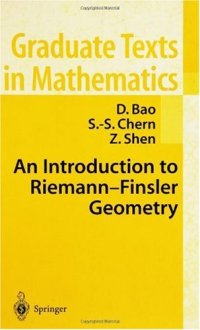
Ebook: An Introduction to Riemann-Finsler Geometry
- Genre: Mathematics // Geometry and Topology
- Tags: Geometry
- Series: Graduate Texts in Mathematics 200
- Year: 2000
- Publisher: Springer-Verlag New York
- Edition: 1
- Language: English
- djvu
In Riemannian geometry, measurements are made with both yardsticks and protractors. These tools are represented by a family of inner-products. In Riemann-Finsler geometry (or Finsler geometry for short), one is in principle equipped with only a family of Minkowski norms. So ardsticks are assigned but protractors are not. With such a limited tool kit, it is natural to wonder just how much geometry one can uncover and describe?
It now appears that there is a reasonable answer. Finsler geometry encompasses a solid repertoire of rigidity and comparison theorems, most of them founded upon a fruitful analogue of the sectional curvature. There is also a bewildering array of explicit examples, illustrating many phenomena which admit only Finslerian interpretations. This book focuses on the elementary but essential items among these results. Much thought has gone into making the account a teachable one.
In Riemannian geometry, measurements are made with both yardsticks and protractors. These tools are represented by a family of inner-products. In Riemann-Finsler geometry (or Finsler geometry for short), one is in principle equipped with only a family of Minkowski norms. So yardsticks are assigned but protractors are not. With such a limited tool kit, it is natural to wonder just how much geometry one can uncover and describe? It now appears that there is a reasonable answer. Finsler geometry encompasses a solid repertoire of rigidity and comparison theorems, most of them founded upon a fruitful analogue of the sectional curvature. There is also a bewildering array of explicit examples, illustrating many phenomena which admit only Finslerian interpretations. This book focuses on the elementary but essential items among these results. Much thought has gone into making the account a teachable one. David Bao is Professor of Mathematics and of the Honors College, at the University of Houston. He obtained his Ph. D. from the University of California at Berkeley in 1983, with Jerry Marsden as his advisor. Before coming to Houston, he did two years of post-doctoral studies at the Institute for Advanced Study in Princeton, New Jersey. Besides differential geometry, he is passionately curious about the ways cats and goldfish think. Shiing-Shen Chern is Professor Emeritus of Mathematics at the University of California at Berkeley, and Director Emeritus of the Mathematical Sciences Research Institute. He is also Distinguished Visiting Professor Emeritus at the University of Houston. Chern received his D. Sc. in 1936, as a student of W. Blaschke. He carried out his post-doctoral studies under E. Cartan. Chern has garnered a good number of distinctions to date. These include the Chauvenet Prize (1970), National Medal of Science (1975), the Humboldt Award (1982), the Steele Prize (1983), and the Wolf Foundation Prize (1983-84). Zhongmin Shen is Associate Professor of Mathematics at Indiana University Purdue University Indianapolis (IUPUI). He earned his Ph. D. from the State University of New York at Stony Brook in 1990 under Detlef Gromoll. He spent 1990-91 at the Mathematical Sciences Research Institute at Berkeley, and 1991-93 as a Hildebrandt Assistant Professor at the University of Michigan at Ann Arbor.